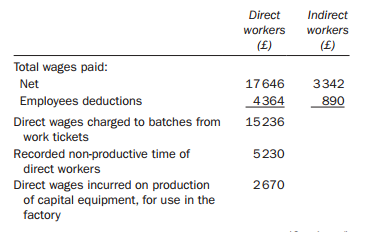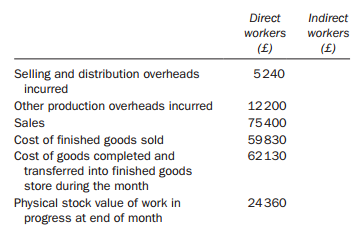In the absence of the accountant you have been asked to prepare a month?s cost accounts for
Question:
In the absence of the accountant you have been asked to prepare a month?s cost accounts for a company which operates a batch costing system fully integrated with the financial accounts. The cost clerk has provided you with the following information, which he thinks is relevant:
...........................................................................(?)Balances at beginning of month:Stores ledger control account ...................24,175Work in progress control account ............19,210Finished goods control account ...............34,164Prepayments of production overheadsbrought forward from previous month ....2,100
.............................................................................(?)Transactions during the month:Materials purchased .....................................76,150Materials issued: to production ..................26,350for factory maintenance ................................3,280Materials transferred between batches ......1,450


The production overhead absorption rate is 150 per cent of direct wages and it is the policy of the company to include a share of production overheads in the cost of capital equipment constructed in the factory.
Required:(a) Prepare the following accounts for the month: stores ledger control account wages control account work in progress control account finished goodscontrol account production overhead control account profit/loss account.(b) Identify any aspects of the accounts which you consider should be investigated.(c) Explain why it is necessary to value a company?s stocks at the end of each period and also why, in a manufacturing company, expense items such as factory rent, wages of direct operatives, power costs, etc. are included in the value of work in progress and finished goods stocks.
StocksStocks or shares are generally equity instruments that provide the largest source of raising funds in any public or private listed company's. The instruments are issued on a stock exchange from where a large number of general public who are willing... Cost Of Capital
Cost of capital refers to the opportunity cost of making a specific investment . Cost of capital (COC) is the rate of return that a firm must earn on its project investments to maintain its market value and attract funds. COC is the required rate of...
Step by Step Answer:






